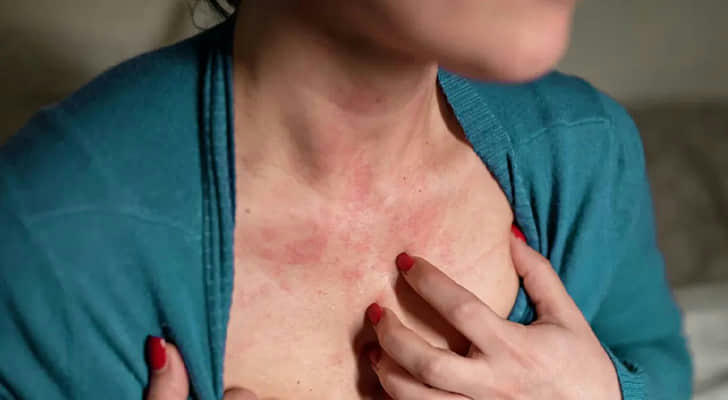Optimizing Lifestyle Choices for Effective Atopic Dermatitis Management

Atopic dermatitis, also known as eczema, is a chronic skin condition characterized by inflammation, itching, and redness. Managing atopic dermatitis requires a comprehensive approach that includes lifestyle changes. By making targeted lifestyle adjustments, individuals can effectively control symptoms and improve their quality of life.
Importance of Moisturizing
Regular moisturizing is essential for individuals with atopic dermatitis as it helps to hydrate the skin and maintain its protective barrier. Using emollients and moisturizers that are fragrance-free and hypoallergenic can help soothe and prevent dryness and itching. Applying moisturizer immediately after bathing and throughout the day as needed can help keep the skin hydrated and reduce flare-ups.
Identifying and Avoiding Triggers
Triggers for atopic dermatitis flare-ups can vary from person to person, making it essential for individuals to identify their specific triggers to effectively manage their condition. Some common triggers include:
Allergens such as dust mites, pet dander, pollen, and mold Irritants like harsh soaps, detergents, and certain fabrics Stress, anxiety, and emotional factors Extreme temperatures or humidity levels
Strategies for identifying triggers include keeping a symptom diary to track flare-ups and potential triggers. Individuals can also undergo allergy testing to pinpoint specific allergens that may exacerbate their symptoms. Once triggers are identified, steps can be taken to avoid or minimize exposure to them, such as using hypoallergenic products, implementing stress-reduction techniques, and creating a more allergen-friendly environment.
Proper Bathing Practices
Proper bathing practices are crucial for individuals with atopic dermatitis to maintain skin hydration and minimize irritation. Some recommendations for effective bathing practices include:
Taking short lukewarm baths or showers to prevent drying out the skin Using mild, fragrance-free cleansers that are gentle on sensitive skin Avoiding scrubbing or rubbing the skin vigorously, which can worsen inflammation Patting the skin dry with a soft towel and immediately applying moisturizer to lock in moisture
Incorporating bathing rituals that are gentle on the skin and avoid stripping away natural oils can help individuals with atopic dermatitis manage their symptoms effectively.
Clothing Choices and Fabrics

Clothing can either soothe or exacerbate atopic dermatitis symptoms, making it crucial for individuals to choose their clothing wisely. Some tips for selecting skin-friendly clothing include:
Opting for loose-fitting, breathable clothing that allows the skin to breathe Choosing soft, natural fabrics like cotton, silk, or bamboo that are less likely to irritate the skin Avoiding rough, scratchy fabrics like wool or synthetic materials that can trigger itching and inflammation
Washing new clothes before wearing them to remove any potential irritants or allergens
By selecting clothing that is comfortable and gentle on the skin, individuals can reduce friction and irritation, helping to minimize flare-ups and discomfort associated with atopic dermatitis.
Importance of Stress Management
Stress is a common trigger for atopic dermatitis flare-ups. Practicing stress-reducing techniques such as mindfulness, deep breathing exercises, yoga, or meditation can help individuals manage stress levels and reduce the likelihood of flare-ups. Incorporating relaxation practices into daily routines can promote overall well-being and skin health.
Maintaining a Healthy Diet
Diet can also play a role in managing atopic dermatitis. Some individuals may find that certain foods trigger their symptoms. Maintaining a balanced diet rich in fruits, vegetables, whole grains, and healthy fats can support skin health. Avoiding potential trigger foods and staying hydrated can help improve skin condition.
Establishing a Consistent Skincare Routine

A consistent skincare routine is crucial for individuals with atopic dermatitis to manage their symptoms effectively and maintain healthy skin. Here are some key points to consider when developing a skincare routine tailored to atopic dermatitis:
Gentle Cleansing:
Use a mild, fragrance-free cleanser specifically formulated for sensitive skin. Avoid harsh soaps or cleansers that can strip the skin of its natural oils and exacerbate dryness. Gently cleanse the skin without scrubbing or rubbing to prevent further irritation.
Moisturizing:
Moisturizing regularly is essential for individuals with atopic dermatitis to keep the skin hydrated and prevent dryness. Choose emollients or moisturizers that are fragrance-free, hypoallergenic, and suitable for sensitive skin. Apply moisturizer immediately after bathing to lock in moisture and throughout the day as needed to soothe dry, itchy skin.
Sun Protection:
Individuals with atopic dermatitis are often more sensitive to sunlight and may experience flare-ups triggered by sun exposure. Use a broad-spectrum sunscreen with SPF 30 or higher daily, even on overcast days, to protect the skin from harmful UV rays. Opt for physical sunscreens containing zinc oxide or titanium dioxide, which are less likely to cause skin irritation.
Exercise and Physical Activity
Regular exercise can benefit individuals with atopic dermatitis by reducing stress levels and promoting overall health. Choosing low-impact exercises and wearing moisture-wicking, breathable clothing can help prevent overheating and irritation. Taking precautions such as showering after exercise and moisturizing can help protect the skin.
Seeking Professional Guidance and Support
Individuals with atopic dermatitis should seek guidance from healthcare providers, such as dermatologists or allergists, for personalized advice and treatment plans. Support groups and online resources can also provide valuable information and emotional support for individuals managing atopic dermatitis.
Conclusion
By implementing lifestyle changes such as proper moisturizing, identifying triggers, maintaining healthy habits, and seeking professional guidance, individuals with atopic dermatitis can effectively manage their condition and improve their quality of life. Consistent self-care practices and a holistic approach to managing atopic dermatitis can help individuals achieve healthier, more comfortable skin.
